Council Begins Parallel Path Toward Cruise Ship Rules
Plan has to adhere to three core principles: public trust, lower visitation, and less lawsuits
BAR HARBOR—Two current lawsuits continue to surround the town’s voter-enacted and citizen-created cruise ship disembarkations. The Town Council would like there not to be any more.
One is a federal suit, currently in appeals, about the constitutionality of changes. One is in state courts, about the Town Council’s March 6 public statement about the implementation and enforcement of those changes, which are meant to be written into the town’s land use ordinance.
The town hopes to stop the litigation, which requires time and attorney fees, which impacts property taxes because someone has to pay for those attorneys. It also hopes to decrease the amount of cruise ship disembarkations in solidarity with the November 2022 vote.
The question becomes how exactly to do that.

Whatever the Town Council does, Town Attorney Steven Wagner of Rudman Winchell and Town Council Chair Valerie Peacock both stressed that it has to adhere to three core principles: there has to be a real or meaningful reduction in cruise ship visitation consistent with the will of the voters in November 2022; an alternative to government by litigation; and it has to have the public’s trust.
“We can solve this problem with communication with each other,” said Town Manager James Smith. “We’re not going to solve it through the courts. It’s really that simple…. What we’re attempting to do today is to start a public discussion and dialogue about how we’re going to solve these endless disputes and litigations. It’s no way for a community to function. It’s the antithesis of what a community is.”
TWO TRACKS
Earlier in the month, the Council directed Smith to look for ways to begin to gather public input and feedback in order to put in place regulatory tools to manage cruise ship visitation.
Some members of the Town Council and Planning Board met Thursday night to discuss the process the Council started, which could create potential changes to the town’s land use ordinance that would deal with the cruise ship ordinance approved by voters in November 2022. That process is a first step in a possible second track to lowering cruise ship visits to the town. That track could be what Councilor Earl Brechlin referred to in May as creating better regulatory tools on the ballot in November and getting a definitive statement on what the community wants to do.
“We want to hear from you. We want to hear your concerns. We want to hear your solutions,” Smith said.
“At the start of the 2022 cruise season, 174 cruise ships of all sizes were scheduled to visit Bar Harbor with a total lower berth capacity of 292,212 passengers,” Cruise Maine’s Sarah Flink said in a court affidavit. A lower berth capacity is the standard double occupancy numbers of a room within the ship
In 2023, the town began memoranda of agreements with the cruise lines and that decreased the schedule for the 2023 season to 134 visiting ships with a total lower berth capacity of 258,157.
By 2024’s season, that number had decreased to 100 with 181,926, Flink said. And for 2025, the requests have been approved for 18 ships with 57,482 passengers.
The November 2022 citizen’s initiative capped cruise ship disembarkations to 1,000 or less a day without fines. It also calls for a permitting system to do that. Some area businesses, Association to Prevent and Protect Local Livelihoods (APPLL) and the Penobscot Bay and River Pilots Association brought that decision to court, where it was upheld. It is currently being appealed.
Those businesses, the association, and cruise line representatives will meet with town representatives on Monday, Wagner said during the Thursday meeting. Those are not public meetings.
One problem, Peacock said on Thursday, is that because of the voter-approved ordinance the town is outside any conversation between the dock owner and cruise ship. However, she feels that because of the federal court ruling upholding Bar Harbor’s home rule, the town is in a better negotiating space when it comes to agreements with cruise lines. Those agreements (MOAs) had created daily and monthly caps and lasted only a certain amount of time. Prior to the MOAs, cruise ships had no booking restraints and could reserve space ten years in advance. They were negotiated just prior to the town citizens voting in the stricter daily caps.
The town says that it is currently pursuing cruise ship disembarkation changes as laid out in the ordinance (the first track) and is also pursuing a second track of action which involves public interactions and potential changes to the land use ordinance.
The Thursday night meeting was the first step in that second track of action. That track has not been set Wagner said. It could, however, replace in whole or in part a piece of the ordinance about cruise ship reservations and that would require amending the LUO. One potential way to regulate the reservations in this track would be to have a licensing process instead of a permitting process.
Part of the problem with how the ordinance was written, Wagner said, is that the town has no authority to say passenger 1,001 has come onshore, triggering the fine and cap limit. If a violation occurs and it is not resolved via consent agreement, it’s brought to the town, the town initiates legal action, goes to court and obtains an opinion that says the town has proven the violation has occurred.
“We’re in ongoing litigation with multiple parties coming at different angles at this,” Wagner said Thursday.
The town is also embroiled in a lawsuit with Charles Sidman, the lead petitioner of the ordinance who also had been involved in defending the changes in federal court. In early April, Sidman filed a complaint in Hancock County Superior Court concerning a March Council statement where it said that the ordinance’s enforcement wasn’t going to be fully in effect for the 2024 season.
On Thursday, Sidman said, “This process that you’re starting here, I have no objections to; it could lead to improvements.”
However, he said, it was the first he’d heard of the conversations scheduled for Monday. He also suggested that while everyone has been talking about the ordinance creating daily 1,000 caps, the actual permits issued could create smaller caps. Say, a permit is issued for 600. If there are 601 disembarkations, that could create a fine, he said.
The fines are on the pier owners, not the cruise lines.
PRESENTATION
On Saturday afternoon, the town uploaded the cruise ship presentation into the agenda/minutes section of its website. The six-page presentation is below. It outlines the Town Council’s Thursday presentation of the cruise ship history from 2008 onward and then a visual representation of its current dual track approach to cruise ship passenger management.
POTENTIAL FUTURE LITIGATION
Peacock broke down all the litigation possibilities for those attending on Thursday. There is an appeal of the existing litigation. Just to bring disembarkation violations to court, the town has to initiate litigation. There are possibilities of “as applies” litigation, which is when new arguments can be made, creating a new court case, new discovery, and potentially a new trial. There is the pre-existing use litigation potential for pier owners. And then there is potential litigation for Harbor Ordinance adjustments.
“We might win all those things,” Peacock said.
One of those potential sources of litigation is whether or not the pier owners have a non-conforming use. The town would likely argue that they do not. The pier owners would likely argue that they do, and therefore, the ordinance’s permitting, which currently is two-tiered. The rules would require the pier owners to receive both a facility permit and a daily permit.
“This question will need to be resolved either through a future lawsuit or through an amendment to the LUO,” Wagner wrote in a May 17 memo to Town Council.
Wagner also cited multiple potential legal issues or potential law suits about the original ordinance track (called Track One by many attending).
One aspect of the federal court’s ruling, upholding the ordinance, was that it “concluded that the ordinance had the ‘potential’ to conflict with federal regulations regarding shore access by seafarers (i.e., crew). That potential problem, the court observed, can be avoided if the town does not apply the ordinance in a manner that would restrict seafarer shore access, contrary to federal law.”
The pilots’ association has argued that the rules that the town is proposing give the town’s harbor master authority that doesn’t comply with the Maine Pilotage Act or federal law about the anchorage in Frenchman Bay.
According to the May 17 memo, “Plantiffs and Mr. Sidman both take issue with the pier owners being required to track the number (of) disembarkations over their properties, but for different reasons. Mr. Sidman suggests that this allows the pier owners to ‘self-govern.’ Plaintiffs suggest that the phrase ‘as determined by the harbor master’ in the Ordinance imposes on the town—not the pier owners—the burden (of) monitoring the pier owners’ properties for compliance.”
Opponents say that since those new daily limits are so low, less than how many passengers are on many ships, it will cut most, if not all, visitation, and that this will impact both local businesses and the town’s budget. Proponents say that the passengers cause pedestrian congestion on sidewalks and decrease the quality of life for Bar Harbor residents.
The Thursday night workshop coincided with a Bar Harbor Chamber of Commerce Business after Hours event hosted by the president of APPLL’s business.
Any changes to the land use ordinance would have to be voted in and go through the town’s legal process.
The Planning Board and public spoke close to the end of the 70-minute meeting. Corey Vane asked how the Council would quantify what a meaningful reduction in cruise ships was. Wagner said that it is unknown currently whether a different number than 1,000 daily disembarkations would be put forward, but if it was, it would be discussed between the parties and the public and voted on.
Nina Barufaldi St.Germain suggested that the town engage in a process liked ranked choice voting and straw polls to gain voter sentiment about numbers.
John Kelly asked about how to avoid litigation in the future. Wagner said he didn’t want to be too prescriptive at the onset of the process.
Smith said during public comment that the town would put information online to help residents visualize the process of any potential land use ordinance changes and other aspects of the possible actions.
Those attending from the Town Council included Peacock, Matthew Hochman and Joe Minutolo. Earl Brechlin, Maya Caines, Gary Friedmann, and Kyle Shank did not attend.
Those attending from the Planning Board included Chair Millard Dority, Vice Chair Ruth Eveland, Secretary Elissa Chesler, Cosmo Nims, and J. Clark Stivers. Zachary Soares was absent.
All photos: Shaun Farrar/Bar Harbor Story.
We’ve updated this story to not use the term “grandfathering” and rather ‘non-conforming” despite the term being used during the meeting. We appreciate the input from a reader about this term’s history and apologize for its use. We’ve also added a definition of lower berth capacity due to a reader’s request. On Saturday, June 15, we updated it with a presentation.
LINKS TO LEARN MORE
Town Cruise Ship Information page.
If you’d like to donate to help support us, you can, but no pressure! Just click here.


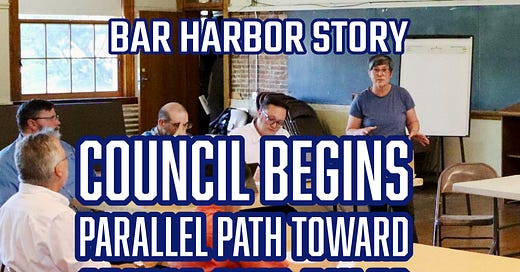






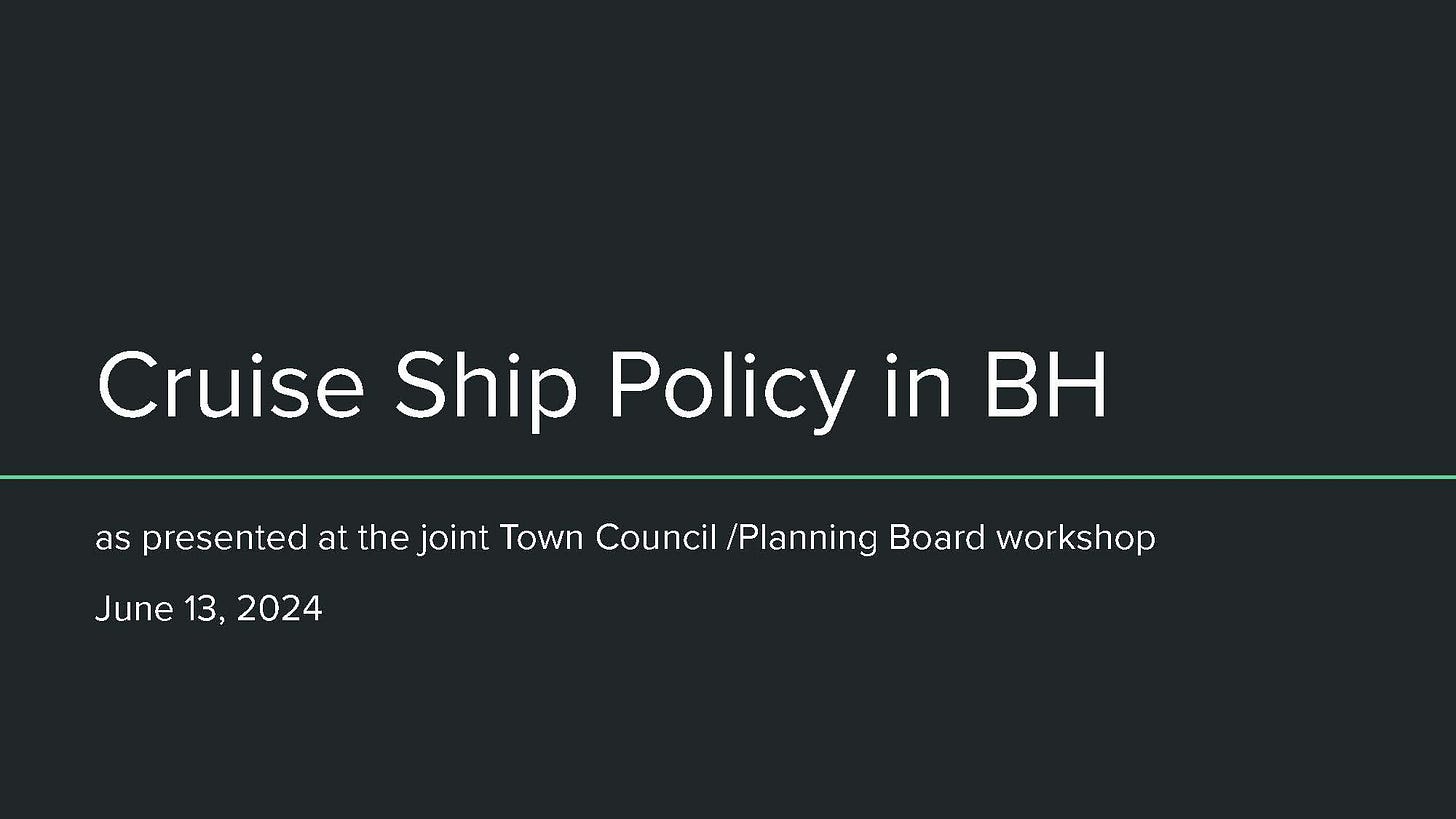
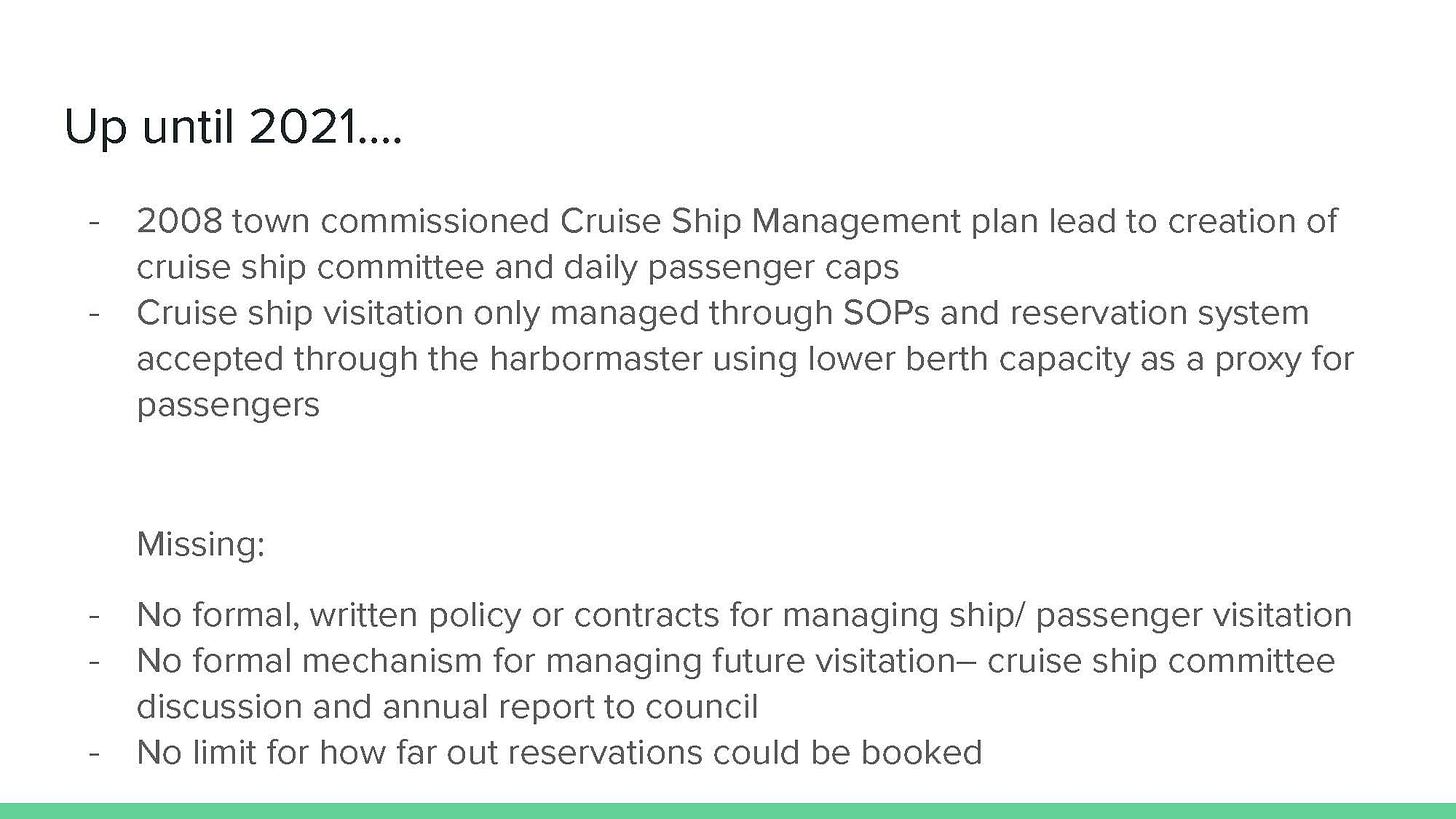
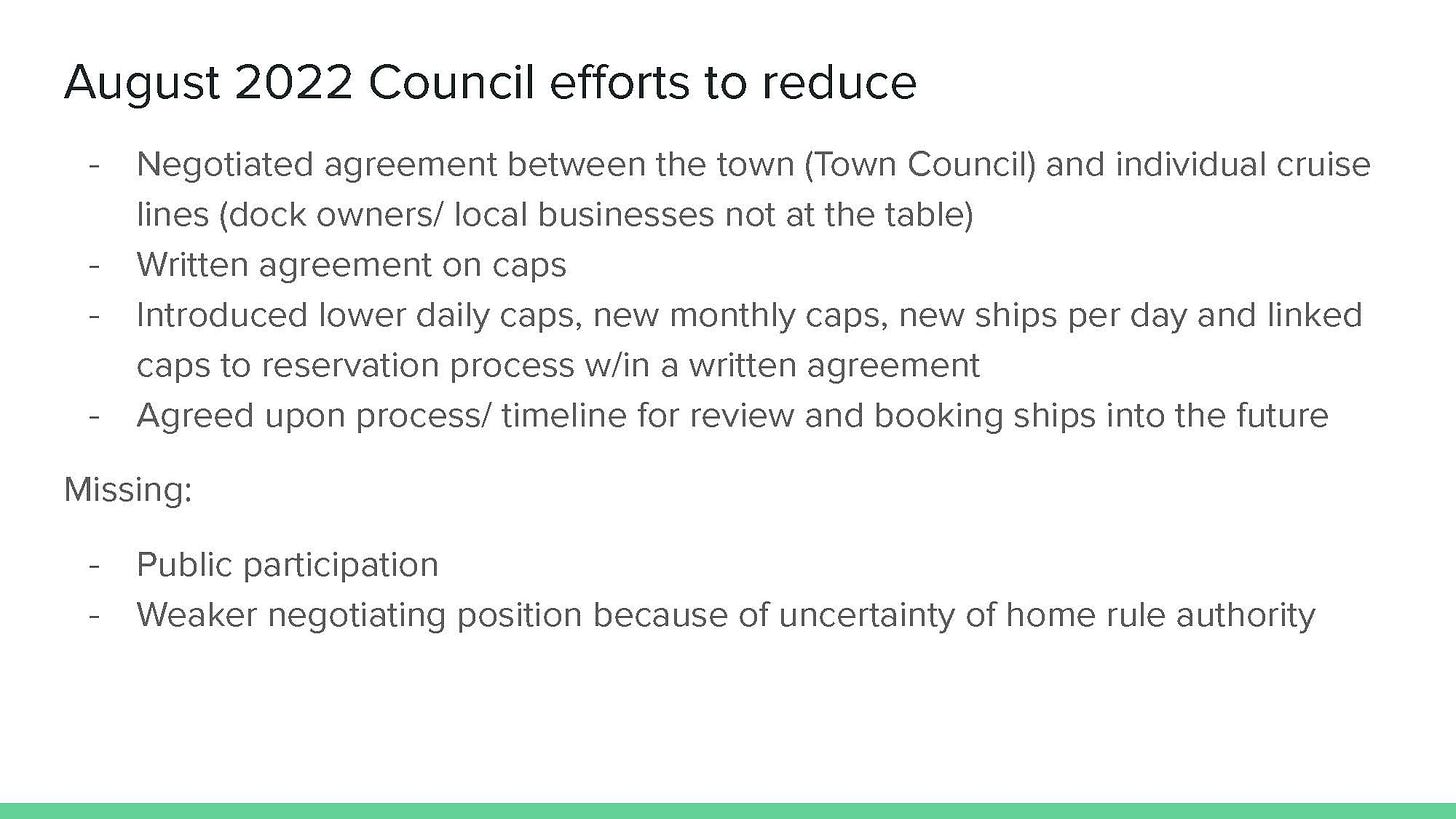
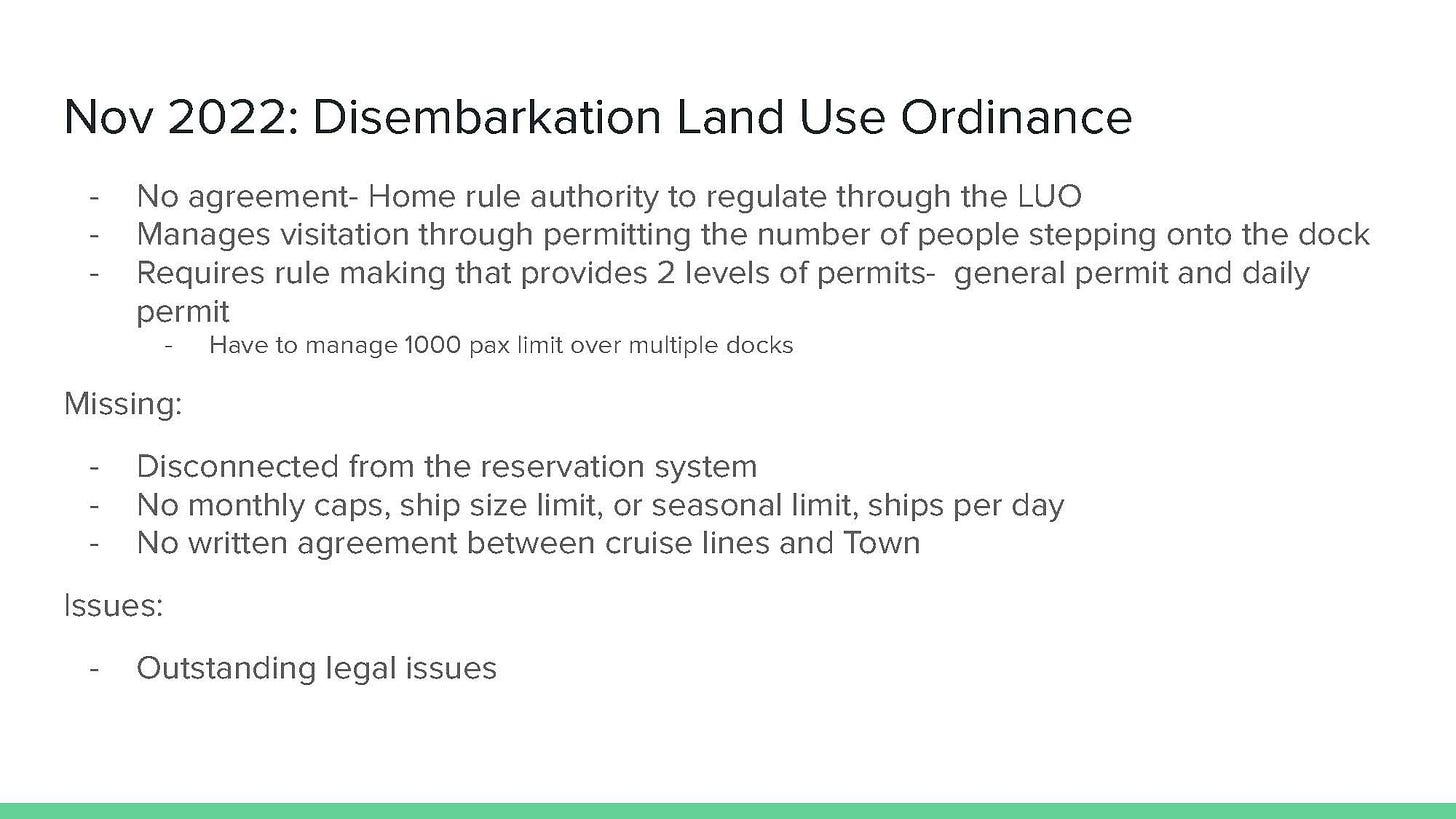
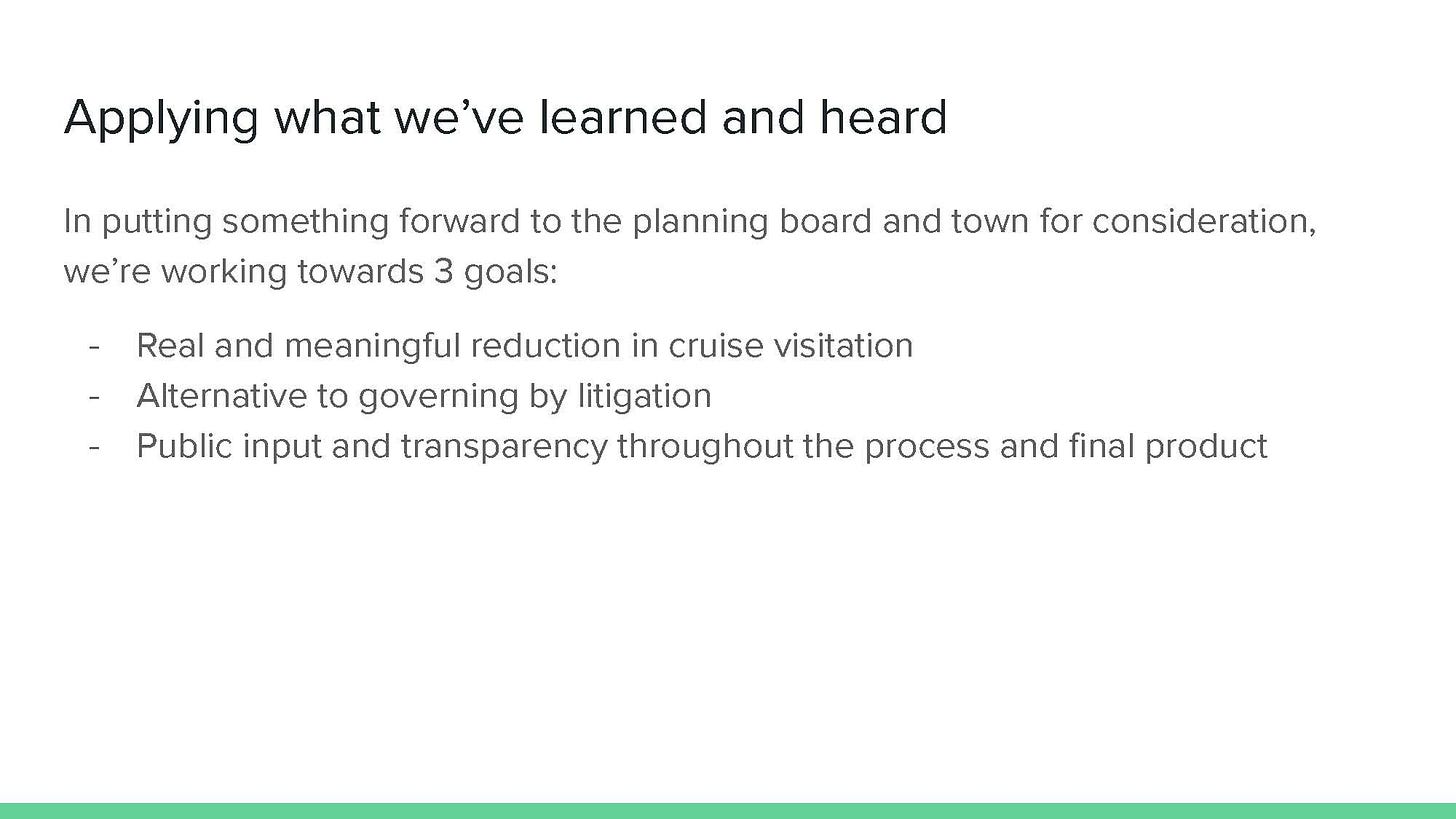








A big to do about nothing. When a ship calls for a reservation it is informed as to how many passengers have already been okayed for the days they request. Obviously a cruise ship is not going to come here if they must deny their passengers the oppurtunity to come ashore. There would be a mutiny. No cruise ship companies are suing Bar Harbor over our Constitutional rights. It is
Ocean Properties that is thwarting the citizens desires. The cost of fighting fruitless appeals is nothing compared to the cost of winning on Home Rule principals. OP cannot legally add more evidence to that case.
They are NOT going to secretly invite ships on their own because only our Harbor Master under direction from our Town’s citizens can do that. The law is 1000 Max Pax. If a ship has to restrict disembarkations it will not come. That is a fact. It is simply OP fighting for over a million in fees that he is allowed to spend wherever he wants , as opposed to the restricted fees the town collects, that the TC and our new Town Manager are fighting for. It is pathetic to secretly meet with the multi billion dollar cruise industy. It is a smack in the face of the voters.
You have explained berth capacity before, but it might be helpful to define that term when it is noted in your articles for those who are reading about the cruise ship issues for the first time.